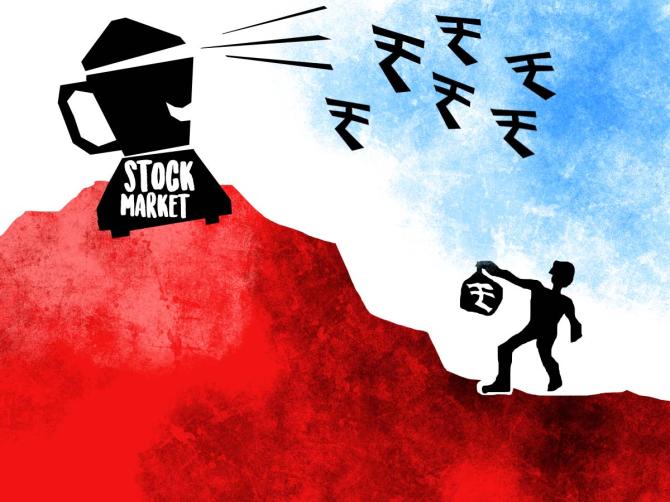'For experienced and risk-taking investors, now may be the time to go all in.'
'By 'experienced and risk-taking', I refer to those who remained net buyers in equities during the early stages of the 2020 pandemic.'
'On the other hand, those who exited the markets during the pandemic may go the SIP way.'

The ongoing Lok Sabha elections in 2024, coupled with the declining voter turnout, have left investors speculating about the election results.
Nilesh Shah, managing director, Kotak Mahindra Asset Management Company, shares his insights on these developments, explores whether the initial low voter turnout is causing concern in the markets, and delves into investment strategies against this backdrop during a Zoom call with Puneet Wadhwa./Business Standard.
With two weeks remaining before the Lok Sabha election results are announced, there's speculation surrounding the 'Abki Baar, 400 Paar' narrative. Should this narrative not play out, will the markets be in more trouble than they are in right now?
The markets are currently pricing in the continuation of government and ongoing reforms.
Whether this continuity is achieved with over 400 seats in the Lok Sabha or fewer, I believe it won't impact the markets as long as government continuity is maintained.
For the long-term health of the market, sustaining reform momentum is essential.
India has made major strides, transitioning from the 10th largest global economy to a trajectory aiming for the third position.
Having evolved from a mere 'coach' to the world economy, India is now positioned as the engine.
However, sustaining this growth trajectory necessitates continuous reforms.
So, why the current nervousness in the markets if there's confidence in the continuity of reforms and government?
The markets have displayed an overly optimistic stance, often preemptively factoring in future events.
Despite the US Federal Reserve deferring rate cuts, market sentiment leans towards expecting a cut sooner rather than later.
Additionally, simmering tensions in West Asia pose a potential threat to oil prices, yet the market maintains a belief in sustained low energy prices.
Moreover, there's a prevailing confidence that corporate results will hold good for the next six to eight quarters.
Amid ongoing elections, with expectations of continued government and reform continuity, the market is exhibiting an overall optimistic outlook.
This optimism propelled the S&P BSE Sensex to reach the 75,000 mark.
However, such heightened optimism naturally leads to market jitters.
The markets have not fallen much from the top, and by no means can it be termed a 'correction'. Rather, it reflects the typical volatility inherent in any market.

IMAGE: Nilesh Shah.
Photograph: Kind courtesy Linkedin
What are the markets not discounting yet?
The market is not discounting that the reforms can be unleashed in a way that can change India's growth orbit from high single digits to double digits.
The market does not have visibility on such growth rates yet.
India needs to be as competitive as, or even more competitive than, China.
More reforms are needed, which are not discounted by the markets yet.
Are concerns mounting in the markets over the National Democratic Alliance potentially losing the plot amid evolving narratives?
From an initial emphasis on economic growth to the 'Abki Baar, 400 Paar' slogan and now billionaires Mukesh Ambani and Gautam Adani being dragged into India's election rhetoric, are these developments creating confusion about the government's broader reform agenda?
The markets possess the acumen to discern between pre-election rhetoric and post-election actions.
However, I believe that minor fluctuations in market performance should not be labelled as corrections or indicative of nervousness.
Last year witnessed microcaps seeing a surge of 60 to 70 per cent, a level of returns typically achieved over a five-year period rather than within a single year.
Attempting to attribute market movements solely to election-related jitters is futile.
What is your perspective on small and midcaps? Are we in for another 'one-two-ka-four' year akin to 2023, or should investors exercise caution?
Largecaps trade at higher valuations, followed by midcaps, smallcaps, and microcaps. However, the reverse is playing out right now.
Microcaps are trading at elevated valuations.
Valuations are above average for small and midcaps, while largecaps are at an average level.
Over the next 12 to 24 months, the return differentials between micro, small, mid, and largecaps are expected to diminish, favouring largecaps.
Does this imply that retail investors might step back, given their preference for micro, small, and midcaps?
Experienced investors prioritise quality investments, whereas the inexperienced chase momentum.
While experienced investors base their decisions on fundamentals, the inexperienced are swayed by social media.
Over time, inexperienced investors will lose money but gain valuable experience.
Do you perceive any signs of irrational exuberance emerging within the market?
There is cause for concern regarding low floating stock counters, as their valuations exceed underlying fundamentals.
What are your expectations for the upcoming full Budget, given its significance for the markets?
I believe the government should continue its commendable efforts towards fiscal prudence.
The interim Budget prior to the polls outlined a 5.1 per cent fiscal deficit, which remains a crucial aspect.
Additionally, there is a substantial amount of gold stored in people's tijoris (safes).
Unlocking the potential of this gold through monetisation is imperative.
This would not only stimulate consumption but also support investment, potentially elevating India's growth trajectory to double digits.
For investors, should they fully commit or opt for a cautious approach like systematic investment plans (SIPs), considering the market's uncertainty?
For experienced and risk-taking investors, now may be the time to go all in.
By 'experienced and risk-taking', I refer to those who remained net buyers in equities during the early stages of the 2020 pandemic.
These individuals demonstrate the capacity to manage their investments and withstand risk.
On the other hand, those who exited the markets during the pandemic may go the SIP way.
Disclaimer: This article is meant for information purposes only. This article and information do not constitute a distribution, an endorsement, an investment advice, an offer to buy or sell or the solicitation of an offer to buy or sell any securities/schemes or any other financial products/investment products mentioned in this article to influence the opinion or behaviour of the investors/recipients.
Any use of the information/any investment and investment related decisions of the investors/recipients are at their sole discretion and risk. Any advice herein is made on a general basis and does not take into account the specific investment objectives of the specific person or group of persons. Opinions expressed herein are subject to change without notice.
Feature Presentation: Rajesh Alva/Rediff.com












 © 2025
© 2025